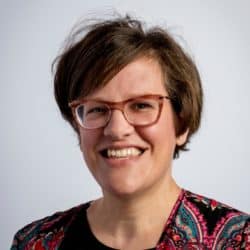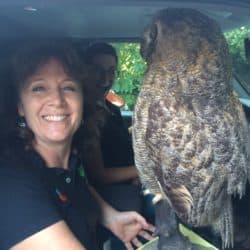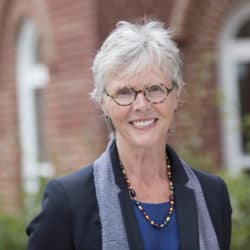As a way to mark the 150th anniversary of confederation, The Philanthropist profiled Canadians from across the non-profit sector and put a face to 150 individuals who work or volunteer in Canada’s social sector. As 2017 drew to a close, we published our final profile of 2017 — reaching our target of speaking with 150 people! The Philanthropist recognizes that Canada’s history did not begin 150 years ago. And it will continue beyond 150 years. In this spirit, we will continue to profile people in the non-profit sector throughout 2018.
Name: April Ingham
Current role in the sector: Executive Director, Pacific Peoples’ Partnership; Board Member, Canada Council for International Cooperation
Years working and/or volunteering in the non-profit sector: More than 25 years.
What was your first job in the sector or a defining moment?
As the first curator of a public gallery in northern BC, I experienced the transformative power of the arts. Early programming focused on local artists and engaging youth. Attendance grew, but there was limited diversity which needed to be addressed. Doing so required personal growth, powerful collaborations, and building strong relationships. “Respect” was the ultimate manifestation as the gallery was put in direct service to First Nation leaders, teachers, and organizations who generously shared personal stories, teachings, art and cultural treasures. The result was an evolving contemporary expression that strengthened community and appreciation of the rich history and resilience of Indigenous peoples.
Describe your desk/workspace.
Balance and connection are important to me. I achieve this by flexing my schedule slightly to avoid travel congestion, working at the office half-time with the remainder at my rural seaside cottage. Based in Victoria, BC, our historic office building is known as the “Save the World building” due to all the fellow charity tenants. Our office is bursting with a 43-year-old collection of archives, library and art from the South Pacific. My home office feels equally and geographically connected to our friends in the South as it is perched on the northern shore of our shared Pacific Ocean.
What are you reading or following that has expanded your understanding of the non-profit sector?
Being mindful and informed on all aspects of non-profit work is essential. The types of knowledge required within the sector is constantly evolving, as is the skill set required. I am always scanning for relevant and timely content through a multitude of sources including the web, email subscriptions (I recommend: Blumbergs’ Canadian Charity Law blog), books and resources for advice, reflections, and best practices. At the foundation of my work is the goal to be an effective, ethical and visionary leader. I look to Indigenous wisdom and teachings, and centre myself through books like The Soul of Leadership by Deepak Chopra.
What do you think our sector needs to be thinking about?
Recently I helped coordinate Red Tide: International Indigenous Climate Action Summit in New Zealand. A presenter spoke powerfully about teaching our children how to survive climate change, underscoring that it is our joint responsibility to ensure they also have a healthy and just future. To achieve this, we must raise the voices of those who are silent or in danger of being left behind, learn about colonization and the Truth and Reconciliation Commission recommendations, and co-design pathways towards meaningful reconciliation. This requires real relationships, shared resources, empathy, and equitable partnerships. We must work together at every level to achieve the UN Sustainable Development Goals by 2030.
Do you know someone we should profile as part of this series? Email us at philanthropistprofiles@gmail.com


